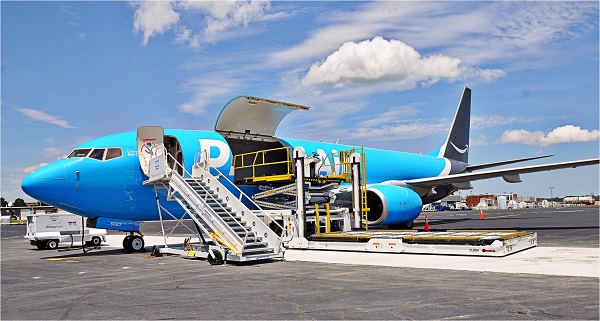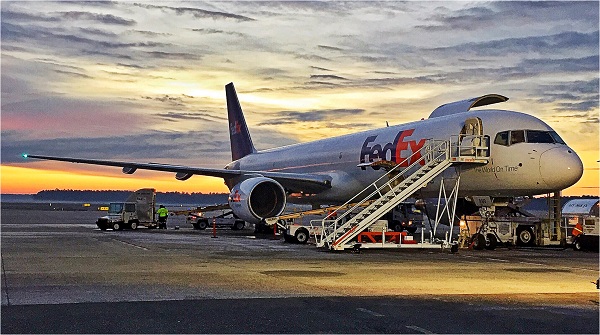Correction: RIC’s previous cargo record was set in 1996. An earlier version of the story incorrectly stated a more recent year.
While 2020 was a devastating year for passenger traffic at airports across the country, it did bring at least one positive traffic trend at Richmond International Airport.
Cargo volume at RIC set a record last year, jumping nearly 14 percent year-over-year to reach nearly 160 million pounds. The total, accounting for both freight and mail, was about 20 million pounds more than the previous year, and surpassed the previous record of 147.77 million pounds set in 1996.
While not nearly enough to offset the drop in passenger traffic, which remains below half of pre-pandemic levels, the bump in cargo is nonetheless a bright spot for the airport from an otherwise dark year.
It’s also reflective of the pandemic’s impacts on buying trends as shoppers have further shifted to online retail, said Troy Bell, director of marketing and air service development for the Capital Region Airport Commission, which owns and operates RIC.
While more cargo means more revenue for the airport, Bell said in an email: “Increased revenue from growing cargo operations only partially offsets decreases related to lower passenger activity.”
Bell said that, so far in fiscal year 2021, cargo has been responsible for about $2 million of the commission’s $14.4 million in revenue, representing about 14 percent of overall operating revenue. In fiscal year 2020, about 7.5 percent of total revenue was related to cargo operations, Bell said.
Bell attributed last year’s cargo volume increase to higher overall demand as the pandemic fueled a rise in e-commerce. He also pointed to increased time sensitivity on items such as replenishments of medical and personal protective equipment supplies.
Bell said the jump is not a result of less passenger traffic making room for more cargo, as different planes are used for each.
“Most air cargo at RIC travels on dedicated all-cargo aircraft operated by companies like Amazon Air, DHL, FedEx and UPS,” Bell said. “Less than 1 percent of the monthly totals here at RIC represent belly freight from passenger airlines.”
Of the 159.2 million pounds in total cargo that passed through RIC in 2020, nearly 66.7 million were put on planes while 92.5 million was deplaned.
The total was nearly double what the airport was handling a decade earlier, when cargo totaled 84.3 million in 2010. Previous yearly increases since then had been relatively more incremental, save for jumps of 16 million pounds in both 2013 and 2016. Only one year, 2014, saw a slight decrease in volume.
For the month of December, cargo volume jumped 42 percent over the same month in 2019, while overall operations decreased 33 percent. Military operations increased nearly 55 percent, while passenger traffic remained a fraction of what it was a year before, with 135,000 passengers representing a nearly 65 percent drop from the previous December.
That’s still a marked improvement from the start of the pandemic, when passenger traffic reached a low of 13,550 in April, a 96 percent drop year-over-year. The previous month, when travel restrictions began taking effect, passenger traffic was about half what it was the previous March, marking an end to a 29-month run of record passenger traffic at RIC.
Passenger traffic for the year totaled 1.7 million, a decrease of about 61 percent from 2019’s record of 4.37 million. Operating revenue for 2020 totaled $14.22 million, about $3.4 million below budget and about $13 million below 2019’s total of $27.32 million.
Correction: RIC’s previous cargo record was set in 1996. An earlier version of the story incorrectly stated a more recent year.
While 2020 was a devastating year for passenger traffic at airports across the country, it did bring at least one positive traffic trend at Richmond International Airport.
Cargo volume at RIC set a record last year, jumping nearly 14 percent year-over-year to reach nearly 160 million pounds. The total, accounting for both freight and mail, was about 20 million pounds more than the previous year, and surpassed the previous record of 147.77 million pounds set in 1996.
While not nearly enough to offset the drop in passenger traffic, which remains below half of pre-pandemic levels, the bump in cargo is nonetheless a bright spot for the airport from an otherwise dark year.
It’s also reflective of the pandemic’s impacts on buying trends as shoppers have further shifted to online retail, said Troy Bell, director of marketing and air service development for the Capital Region Airport Commission, which owns and operates RIC.
While more cargo means more revenue for the airport, Bell said in an email: “Increased revenue from growing cargo operations only partially offsets decreases related to lower passenger activity.”
Bell said that, so far in fiscal year 2021, cargo has been responsible for about $2 million of the commission’s $14.4 million in revenue, representing about 14 percent of overall operating revenue. In fiscal year 2020, about 7.5 percent of total revenue was related to cargo operations, Bell said.
Bell attributed last year’s cargo volume increase to higher overall demand as the pandemic fueled a rise in e-commerce. He also pointed to increased time sensitivity on items such as replenishments of medical and personal protective equipment supplies.
Bell said the jump is not a result of less passenger traffic making room for more cargo, as different planes are used for each.
“Most air cargo at RIC travels on dedicated all-cargo aircraft operated by companies like Amazon Air, DHL, FedEx and UPS,” Bell said. “Less than 1 percent of the monthly totals here at RIC represent belly freight from passenger airlines.”
Of the 159.2 million pounds in total cargo that passed through RIC in 2020, nearly 66.7 million were put on planes while 92.5 million was deplaned.
The total was nearly double what the airport was handling a decade earlier, when cargo totaled 84.3 million in 2010. Previous yearly increases since then had been relatively more incremental, save for jumps of 16 million pounds in both 2013 and 2016. Only one year, 2014, saw a slight decrease in volume.
For the month of December, cargo volume jumped 42 percent over the same month in 2019, while overall operations decreased 33 percent. Military operations increased nearly 55 percent, while passenger traffic remained a fraction of what it was a year before, with 135,000 passengers representing a nearly 65 percent drop from the previous December.
That’s still a marked improvement from the start of the pandemic, when passenger traffic reached a low of 13,550 in April, a 96 percent drop year-over-year. The previous month, when travel restrictions began taking effect, passenger traffic was about half what it was the previous March, marking an end to a 29-month run of record passenger traffic at RIC.
Passenger traffic for the year totaled 1.7 million, a decrease of about 61 percent from 2019’s record of 4.37 million. Operating revenue for 2020 totaled $14.22 million, about $3.4 million below budget and about $13 million below 2019’s total of $27.32 million.

